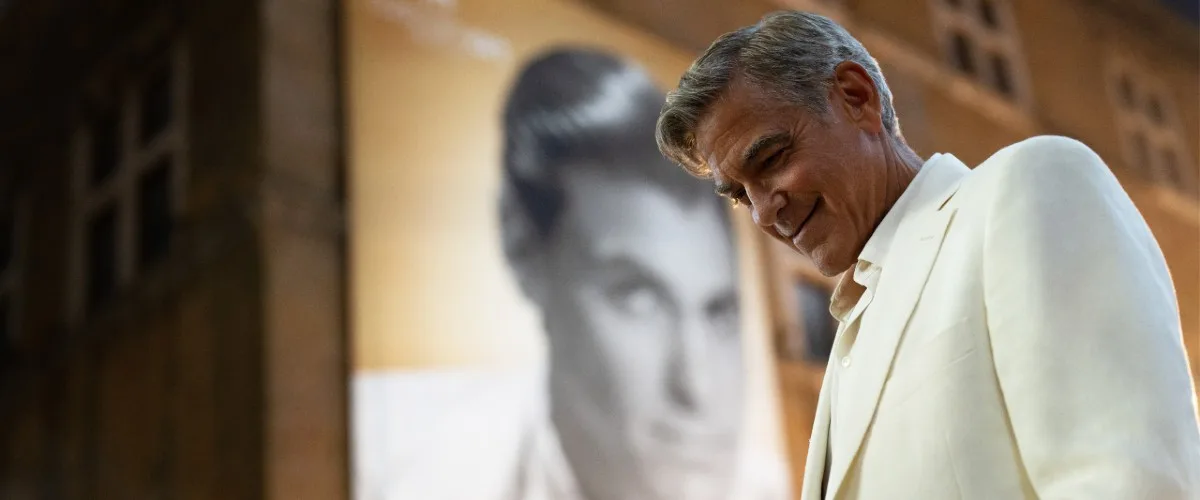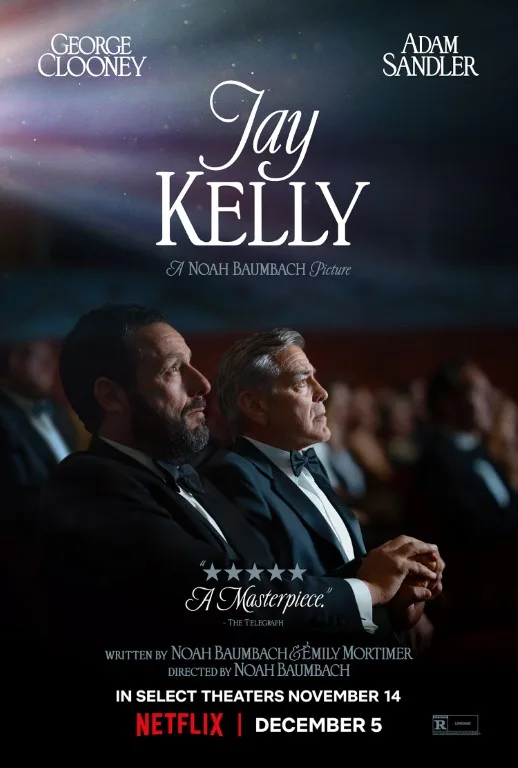Noah Baumbach’s “Jay Kelly” is a study of a man in the middle of a personality crisis who worries that he doesn’t have one, only the personalities which fictional characters and the glory of celebrity have granted him. It’s a deeply meta film, a movie that uses as its foundation what we know of its star, George Clooney, one of the few leading men who can coexist in the same frame with images of legends like Paul Newman and Marcello Mastroianni and we don’t immediately reject the idea. Clooney knows a thing or two about not being able to walk through public spaces without being mobbed and, one presumes, about how much the life of an actor pulls people away from other things in their lives, like friends and family.
For a story of a guy who’s willing to get messy for the first time in years, it’s an overly clean piece of screenwriting, one that too often lets its A-list star play ideas instead of a character. But there’s enough to like here to forgive a film whose ambition exceeds its reach, both in some of those ideas and a flawless supporting cast, especially another fantastic turn from Adam Sandler.
“Jay Kelly” opens with its titular character (Clooney) finishing his latest production, as Baumbach and his co-writer Emily Mortimer (who also has a small role) wonderfully sketch their two male leads through their work. Kelly seems to be tapping into something true as he films the emotional death scene of his character. Still, there’s a common actorly insecurity underneath, especially as he asks his director for reassurance about whether they should try again. Meanwhile, Jay’s manager Ron (Sandler) uses the same tone to comfort Jay that we just heard him using with his daughter on the phone. For Ron, Jay is almost like another child, someone whose needs are prioritized over his own, and whose insecurities need to be assuaged. He might even be Ron’s favorite child. He’s the one who pays the bills.
A series of events rocks Jay Kelly’s pattern of movie shoots and red carpets (and, by extension, Ron’s). First, Jay discovers that his daughter, Daisy (Grace Edwards), is leaving for the summer, the one he thought they would spend together. She’s off to Northern Italy, where, coincidentally, an arts festival is being held at which Jay was supposed to receive a tribute. Jay will be on his own, and we discover later that he has a borderline-estranged relationship with his older daughter, Jessica (Riley Keough, so phenomenal in just a few scenes). He’s going to be alone, although, in a funny repeated bit in which Jay is handed drinks by silent assistants after insisting he’s always alone, the “celebrity alone” is different than yours or mine.
A bigger shift in Jay’s personality starts to quake when he learns that the director who gave him his break, Peter Schneider (Jim Broadbent), has died. Jay remembers a Schneider at his home not long ago, practically begging to put his favorite actor’s name on his project to get funding. Jay declined. He never gave the man he owes much of his life his last shot.
Finally, Jay runs into an old friend at Peter’s funeral named Timothy (Billy Crudup, excellent as always in just one extended scene). The two go out for a drink, and what starts as playful memories of their twenties and what might have been gets dark when Timothy admits that he hates Jay. After all, Jay “took his life.” If Timothy hadn’t brought Jay to an audition in front of Peter Schneider, he might have gotten the job. The night ends in a flurry of bad, half-drunk choices that really send Jay spiraling. He’s not doing the next movie, he’s going to Italy to find his daughter and accept the tribute, and Ron and his publicist Liz (Laura Dern) are just going to have to keep up with him. If they can.
The first act of “Jay Kelly,” in which these emotional figures from Jay’s past descend on him like Scrooge’s ghosts, hints at a darker movie than the midsection, one in which Kelly travels across Italy by train to reunite with his daughter and the common people. Clooney captures the joy of an actor fascinated by those who celebrity has cordoned off from him. But the writing here dips into some odd valleys regarding his fellow travelers, including an aside about a purse theft that exists solely as a plot crutch later in the film. It’s a bit of a problem when a movie about a celebrity trying to meet “real people” and discover the true core inside him starts to feel calculated and manufactured. And that tone starts to infiltrate other aspects of the screenwriting, including characters played by Stacy Keach (Jay’s dad) and Patrick Wilson (Ron’s #2 client), who seem to exist solely as signposts for Jay’s journey of the soul.
The sense that too few of the supporting characters have been fleshed out is part of what makes “Jay Kelly” often feel a little too neat. It’s a film that works in part because it’s an actor we know looking at the traps of celebrity and the difficulty of playing yourself instead of a scripted character, but it also feels remarkably calculated. Part of that is intentional to make the undeniably powerful final lines hit with more force, but a lot of “Jay Kelly” feels as rehearsed as a celebrity’s sound bites at a junket. Even Nicholas Brittell’s lovely score and Linus Sandgren’s fluid cinematography add to the film’s often sterile tone when it should be a movie that’s rougher around the edges.
Thank Celebrity God, then, for Adam Sandler, who steals the movie by feeling the most truthful. I would never purport to know Sandler’s complex emotional relationship with fame or with people in his life, but he understands, either through observation or experience, what it means to devote your life to someone in a power imbalance. Are Ron and Jay friends? They’ve been through it all together. But Jay pays Ron, and he’s not afraid to remind him of that. Doesn’t that automatically throw it off? Sandler perfectly embodies a guy who’s been hit by Jay’s emotional shrapnel over and over again. Every time Jay missed a school concert for a project, Ron probably did too. Rons don’t get tributes. It’s just another example of how good Sandler can be in the right material, his best performance since “Uncut Gems” (and a reminder of how good he was in Baumbach’s “The Meyerowitz Stories”).
There are several lines about the transparency of fame that pepper “Jay Kelly.” Peter’s son says at his funeral, “My dad was never there.” It’s something Jay’s daughters would say too, especially his older one. In one of the film’s most powerful emotional chapters, Jessica speaks of the pain of seeing her dad playing a loving parent on screen despite never feeling that at home. So does Jay find himself? Luckily, Baumbach, Mortimer, and Clooney refuse to give Jay Kelly too much of a redemption arc, ending on a note that feels more emotionally true than manipulative. It lands with a powerful sentiment that so many of us will feel when the end is near. If we’re as lucky as Jay Kelly.
In select theaters tomorrow, November 14, and on Netflix on December 5.




















